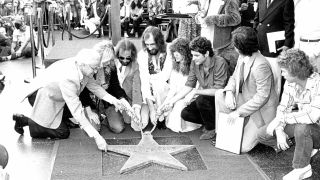It’s a common scenario in rock. A band records an album which takes off beyond anyone’s wildest dreams and sells millions. Confronted with having to record a follow-up, they either indulge the new avenues which success has opened up and explore every far-fetched fantasy, or find themselves spending a fortune trying to create something which will match, or preferably top, that huge success.
When required to follow the multi-platinum (and rising) Rumours, Fleetwood Mac went their own way and gave the world (and their impatient record company) the monstrous Tusk, the most expensive album in history (although Lindsey Buckingham would defend that dubious accolade as “we happened to be in a studio that was charging a fuck of a lot of money”, pointing out both albums took ten months to record).
While Tusk was received with a mixture of positive acclaim and poisoned darts about self-indulgence, it has seen its own mythos build in the 36 years since its release, joining the much-trod ongoing soap opera which its predecessor manifested. But while Rumours went on to sell 40 million, the coked-up self-indulgence part stuck around Tusk, which became universally regarded as the Mac’s huge white elephant, invoking derision and sniggers at the mention of its name.
It certainly didn’t help that Fleetwood Mac chose to build a widescreen double album amidst the confined heat of punk rock’s Molotov cocktails, thus setting themselves up as the old-fashioned embodiment of out-of-touch Californian excess. But, double albums withstanding, this blissful splendid isolation was working for the Doobie Brothers, so why not them?
Every great act makes their double album, usually as the only means to present the personal statements and material they now have at their disposal. It’s worth thinking back to the receptions given to other major doubles when they were released. Dylan’s Blonde On Blonde, the Beatles’ White Album, Jimi’s Electric Ladyland, the Stones’ Exile On Main Street and The Clash’s London Calling all incurred similar flak on release, usually including the words “self-indulgent” and “sprawling”.
But while these records have seen their statuses elevated over the years and have long been considered peaks of expression, Tusk seems to have gone in the opposite direction, even relegated to the realms of grand folly.
Like Keef with Exile, when I interviewed Mick Fleetwood a few years ago he said Tusk was his favourite Mac album. I then managed to find an original copy for two quid in an Oxfam shop, to replace the one I had at the time which was borrowed then, maybe tellingly, never returned.

Imagine the pressure the band were under when they entered LA’s Village Recorder in 1978 to try and follow the phenomenon that was Rumours (which itself had topped its breakthrough predecessor, Fleetwood Mac). The breakups so evocatively documented on that album had now solidified as a divided group, while the astronomical cocaine intake and certain sense of entitlement after years spent struggling also coloured the new album’s creation.
Suddenly Fleetwood Mac were in the big league, so enjoyed it to the hilt as they forged their double album with the relish of new superstars and megalomaniac ambition of a Cecil B. De Mille movie, as each of the band’s three songwriters followed their personal muses and overfed noses.
It was indeed the right time to make a record with no commercial fences to constrain it and they decided to explore rather than replicate Rumours. As a result, they came up with a less direct but, ultimately longer-lasting album, though cursed with such a legend subsequent generations may not give it a fair listen. Tusk is in fact the only album Fleetwood Mac could have made after the success of Rumours; their statement of disarray, drug-fuelled mania and personal visions, although often sweet as sugar or stripped down to bare, quivering bones.
The latter mainly applies to Lindsey Buckingham’s wired creations, which often reach back to Buddy Holly and the raw untamed spirit of rock’n’roll. Stevie Nicks now had an open ticket to explore any planet or arcane myth which tickled her fancy, while Christine McVie held the middle ground with melodic dexterity.
Now, with the coming of a deluxe version of the album, it’s the right time to reassess Tusk as a major work in its own right. Against Stevie’s protests, Mick Fleetwood even named it after a slang-word for stiffie; possibly as a companion to the wooden balls he has dangled proudly over his crotch for the last 45 years or maybe in reference to the pair of elephant tusks he had mounted on either side of the recording console.
Listening to Tusk on the new box set is like experiencing a period pop art project from coked-up California in the late 70s. Without having to change the sides of a record, it’s also less of a physical process. The advent of the CD meant album running times increased anyway.
Tusk clocks in at just over 74 minutes, which is within the limits for a single CD. It boasts 20 tracks and, as many have commented, almost amounts to three artist albums in the same package as Buckingham, on a manic creative jag, supplied nine tracks, Christine contributed six and Stevie conjured five.
Even the act of starting the album with a ballad was a brave, even defiant move. Christine’s Over And Over is the first of her intimate, often moving confessionals, which seem to be reflecting on the aftermath of her messy breakup with John McVie. It’s one of the albums most covered tunes, including Primal Scream on 2008’s Beautiful Future.
Christine’s innately melodic contributions have stood the test of time better than anything else on the album; the beautiful but soul-baring Never Make Me Cry (whose heart-wrenching point is underlined with an alternative mix on the bonus disc), hauntingly lovely Brown Eyes (with a returning Peter Green’s ghostly magic draping the alternative version), mellow rocking Think About Me, bitter-sweet Never Forget and languid island love song Honey Hi. That’s already half a top notch single album in old money.
Stevie’s tunes didn’t disappoint her fans at the time and she still sounds like no one else on the colossal single Sara, which now comes with edited 45 version and another which boasts her protesting “I don’t wanna be a cleaning lady!” before setting off on another star-kissed flight to the domain of the magic rabbit.
Or so it might sound; the song was said to have been about an abortion she had during her time with Don Henley, while Fleetwood explained it as being about the girl he had an affair with which ended his fling with Nicks. Who really knows in Mac world? Stevie orbits similar ethereal terrain on Sisters Of The Moon but Storms ranks among the Mac’s great ballads (graced with a fabulous alternate version drenched in rich organ and another starker but time-stopping version).
Then there’s the sweet country rock of her Angel and intimately poignant Beautiful Child. Earth called Stevie and she more than delivered, providing the astral ying over McVie’s more grounded yang.
That leaves the nine Lindsay Buckingham cuts, now sounding like artificial energy highs snorting against the melodic balm of the other two writers. These outings are where the controversy lay, attracting accusations of incoherent lunacy or even a concerted stab at new wave.
While he knew of the Gang Of Four and similar acts, Lindsay was caught in a wave of manic creative impulses, shredded reality and soul-flooding drugs, famously recording while doing push-ups on a miked up studio floor and hacking off his hair with nail scissors in the shower. To blanket dismiss his contributions is wrong and even fed by ignorance, even if tracks such as The Ledge, Not That Funny and I Know I’m Not Wrong initially seem brittle, shrill and even flimsy compared to the rest of the album (underlined by the multiple bonus versions of the latter as a work in progress).
Heard now, they gave the album its essential light-and-dark edge. Meanwhile, That’s All For Everyone is like a Brian Wilson Pet Sounds out-take with its exotic marimba textures and Walk A Thin Line is the kind of desperate ballad Alex Chilton turned into a corroded art form with Big Star. That’s Enough For Me still wields the melody of a Rumours nugget, except it’s planted on a speedy country hoedown stomp.
Then there’s the title track, which perhaps indicated the Mac’s mindset at the time when it was chosen as first single from the album. When the band were stuck for a title tune for their still unnamed album, they worked up the riff Lindsey used at sound-checks, adding Fleetwood’s African drum pattern and, finally, the University marching band and dark vocal incantation to come up with the album’s Revolution No. 9.
Despite reaching number four in the US album charts, number one in the UK, selling four million double units and dispatching hits such as Sara and Think About Me, Tusk seems set in stone as the band’s grand failure; certainly by Warner Brothers, who blamed Buckingham’s idiosyncrasies, while Fleetwood cited RKO Radio playing the whole album for a nation of home tapers as one good reason.
As the band which produced the album continue to sell out arenas around the world, what better time to revisit the album in the Deluxe Edition about to be fired from the pods at Warner Brothers? Here you will find the original remastered album and a whole alternative version made up of out-takes, plus the usual singles, demos, works-in-progress and remixes, along with two discs drawn from 1979’s Tusk tour and a book.
Whether a valiant attempt to reposition this much derided work or a nice little earner for Christmas, Tusk should definitely be considered a vital part in Fleetwood Mac’s convoluted, ongoing story. Although stoked by regular lineup changes, the band’s sound never stood still and hits were not their major concern here. Instead, there was something deeper to get out and it should be reconsidered and applauded as an epic kiss-off to the 70s.


